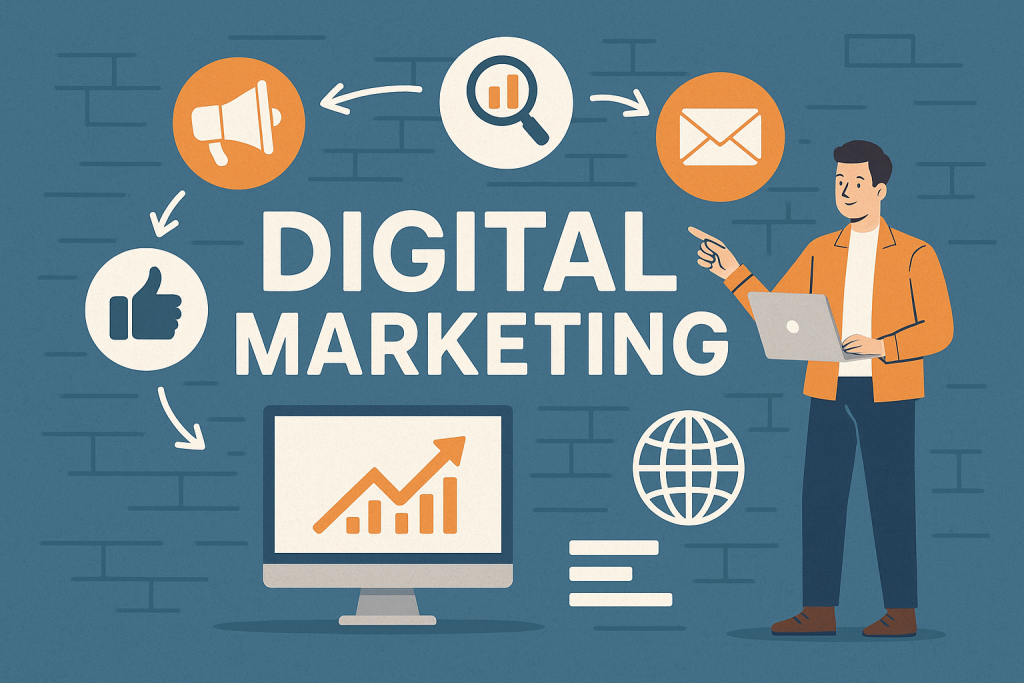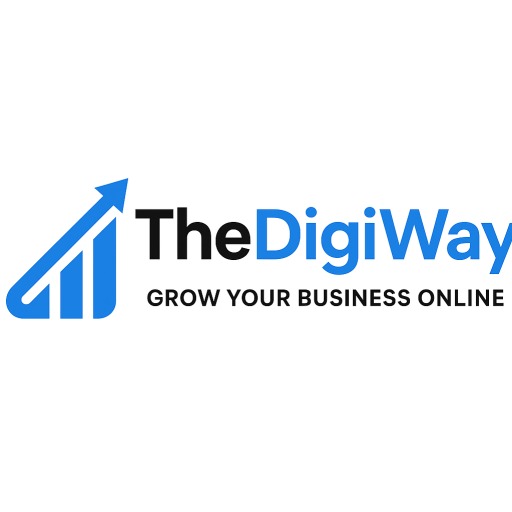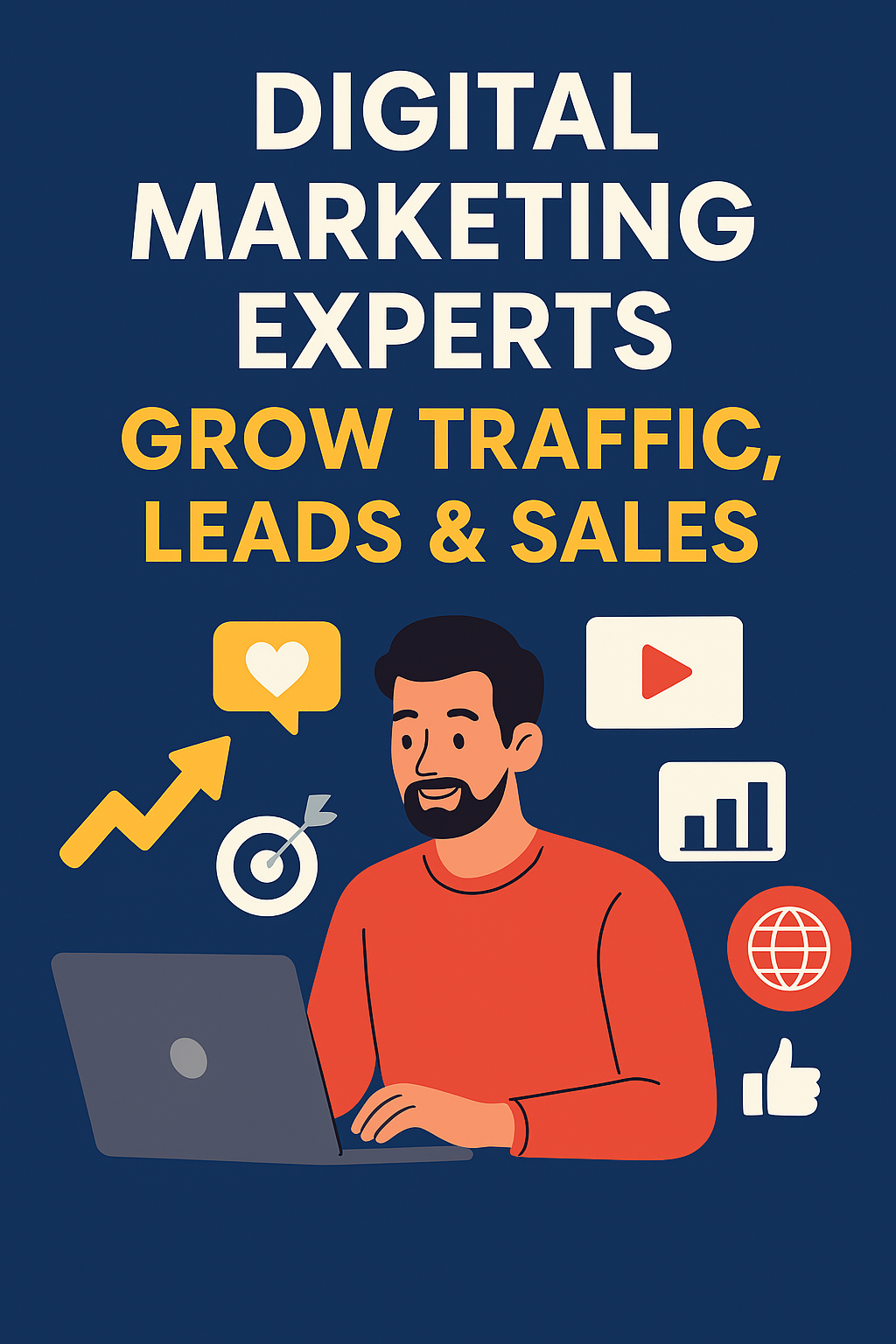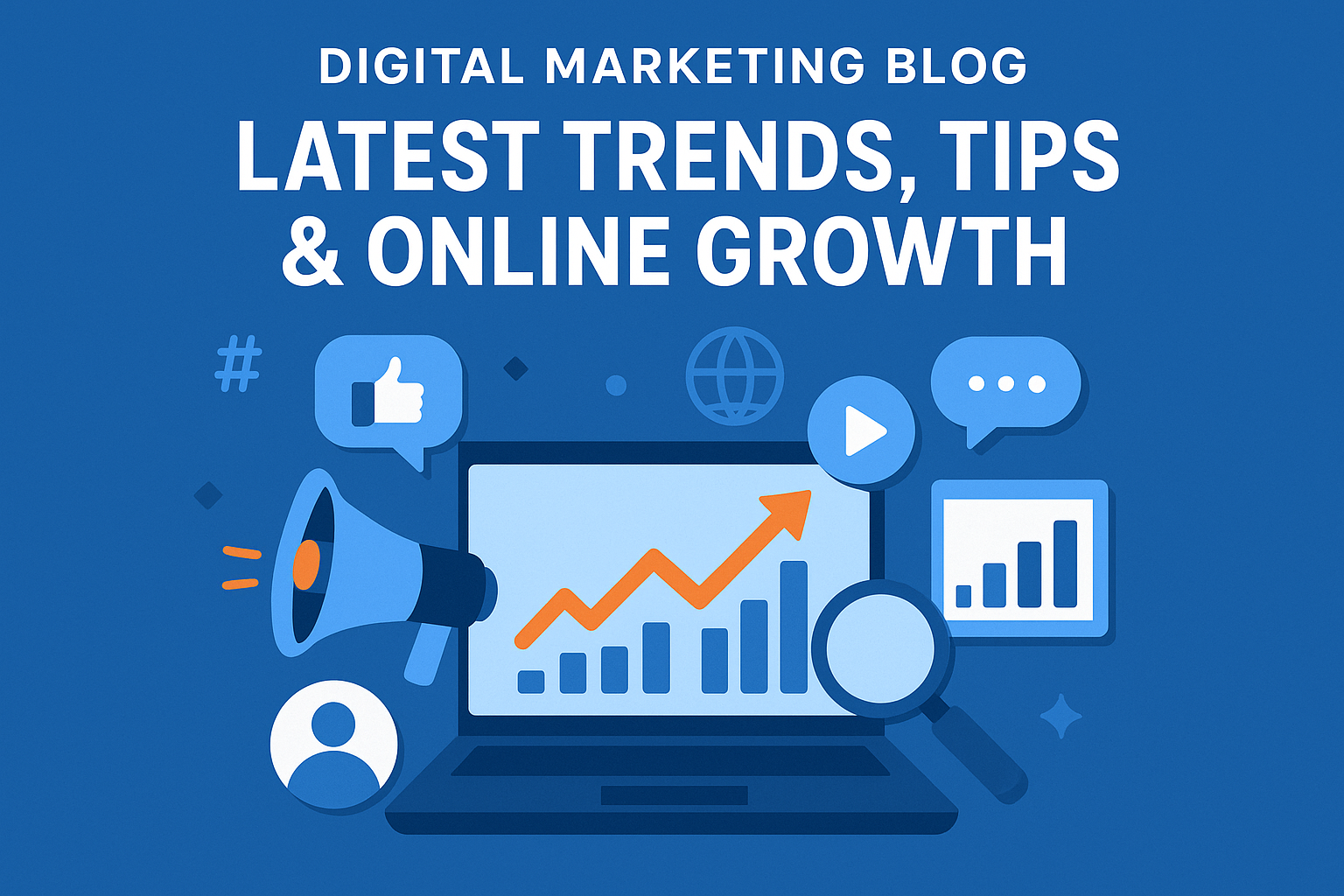Introduction

In today’s connected world, businesses can no longer rely only on traditional advertising methods such as television, newspapers, or billboards. Customers now live online—searching, comparing, and making decisions through digital platforms. This shift has transformed the way brands connect with audiences, making Digital Marketing a vital part of every growth strategy. Whether you are a small startup or a large enterprise, online visibility plays a crucial role in building trust, generating leads, and boosting sales.
Digital Marketing is not just about running ads; it is about creating meaningful interactions with your audience through multiple online channels. From search engines to social media, from content to email campaigns, this form of marketing gives businesses the ability to reach customers exactly where they spend most of their time—online.
This article will explore the importance, core components, benefits, latest trends, and steps to build a successful strategy so that you can fully understand how to use Digital Marketing to grow your business.
Why Digital Marketing Matters
Traditional marketing methods often involve a lot of guesswork. When a company places a television commercial or a newspaper ad, it cannot accurately measure who saw it, how they reacted, or whether it led to a sale. In contrast, Digital Marketing provides precise data and insights. Businesses can track website visits, monitor conversions, analyze customer behavior, and adjust strategies in real time.
Another reason why Digital Marketing matters is cost-effectiveness. Small businesses with limited budgets can compete with larger organizations by targeting specific audiences instead of spending blindly. For example, a clothing brand can advertise directly to people interested in fashion, instead of paying for a broad television spot that may or may not reach the right customers.
Perhaps the most powerful aspect of Digital Marketing is its global reach. A local bakery can promote products to customers in its city, while an e-commerce store can attract buyers from around the world—all with just a few clicks. This kind of targeted and measurable reach was simply not possible before the digital revolution.
Core Components of Digital Marketing
Search Engine Optimization (SEO)
SEO is the process of improving a website’s visibility on search engines like Google. When potential customers search for products or services, businesses want to appear on the first page of results. SEO includes optimizing website content, improving site speed, using the right keywords, and building backlinks. A strong SEO strategy ensures long-term online visibility and strengthens overall Digital Marketing efforts.
Content Marketing
Content is the backbone of Digital Marketing. Blogs, articles, videos, infographics, and podcasts provide value to customers while building trust in a brand. High-quality content not only attracts visitors but also establishes authority in an industry. For example, a fitness brand can publish blogs about healthy lifestyle tips, positioning itself as an expert while subtly promoting its products.
Social Media Marketing
Platforms like Facebook, Instagram, LinkedIn, and Twitter give businesses the opportunity to engage directly with their audience. Social media marketing involves posting regular updates, running paid campaigns, responding to comments, and building a community. It’s a powerful tool for storytelling and humanizing a brand, making it one of the most engaging parts of Digital Marketing.
Email Marketing
Despite the growth of social platforms, email remains one of the most effective channels. Email marketing allows businesses to send personalized messages, promotions, and updates directly to a customer’s inbox. Unlike social media, where algorithms decide visibility, emails land straight in front of the audience and help strengthen Digital Marketing campaigns.
Pay-Per-Click Advertising (PPC)
PPC campaigns, such as Google Ads, enable businesses to appear at the top of search results instantly. Instead of waiting for organic rankings, companies can pay to display ads targeted at specific keywords and demographics. The best part is that advertisers only pay when someone clicks on their ad, ensuring efficient use of budget within a Digital Marketing strategy.
Influencer and Affiliate Marketing
With the rise of influencers, brands can now partner with individuals who already have a strong online following. Affiliate marketing, on the other hand, involves rewarding partners who bring in traffic or sales. Both methods expand reach and drive trust through recommendations, making them valuable extensions of Digital Marketing.
Together, these components form the foundation of Digital Marketing, ensuring businesses stay relevant and competitive in a fast-changing online environment.
Benefits of Digital Marketing for Businesses
Increased Brand Visibility
A well-executed digital strategy ensures that your brand appears in front of the right audience at the right time. This builds recognition and keeps your business top of mind when customers are ready to buy. With the right Digital Marketing techniques, even small businesses can establish a strong brand presence.
Customer Engagement
Unlike traditional ads, digital platforms encourage two-way communication. Businesses can engage with customers through comments, live chats, surveys, and interactive content. This not only builds loyalty but also provides valuable insights into customer needs, helping shape better Digital Marketing campaigns.
Lead Generation and Conversions
Digital Marketing is designed to convert attention into action. Whether it’s filling out a contact form, making a purchase, or signing up for a newsletter, online strategies are built to guide customers smoothly through the sales funnel.
Measurable Results
From impressions to clicks to conversions, every action can be tracked and analyzed. This transparency helps businesses refine campaigns for better performance, ensuring resources are used effectively. With Digital Marketing, guesswork is replaced by solid data.
Digital Marketing Trends in 2025
AI and Automation
Artificial intelligence is making campaigns smarter. From chatbots that handle customer queries to automated ad placements that optimize spending, AI is reshaping how businesses manage Digital Marketing.
Voice Search Optimization
With the popularity of smart speakers, voice searches are increasing rapidly. Businesses need to optimize content for conversational queries like “best coffee shop near me” to stay relevant in their Digital Marketing approach.
Video and Short-Form Content
Platforms like TikTok, Instagram Reels, and YouTube Shorts are driving engagement through quick, snackable content. Brands that master short-form videos can capture attention faster than ever before, making video a critical part of modern Digital Marketing.
Personalization
Customers expect more than generic messages. Personalized recommendations, offers, and experiences increase engagement and sales. Using data responsibly allows businesses to deliver tailored marketing without being intrusive, strengthening customer trust in Digital Marketing.
By following these trends, businesses can stay ahead and continue to succeed in the ever-evolving world of Digital Marketing.
How to Build a Digital Marketing Strategy
Set Clear Goals
Identify what you want to achieve—brand awareness, leads, or direct sales. Clear objectives are the foundation of an effective Digital Marketing plan.
Understand Your Audience
Research customer demographics, interests, and online behavior to create buyer personas. Knowing your audience ensures your Digital Marketing campaigns resonate with the right people.
Choose the Right Channels
Select platforms that align with your audience. For example, LinkedIn for B2B, Instagram for lifestyle brands. A smart choice of platforms ensures that your Digital Marketing investment delivers results.
Create Valuable Content
Develop content that educates, entertains, or solves problems for your audience. Strong content is the heart of Digital Marketing, making it easier to build long-term trust.
Implement Tracking Tools
Use Google Analytics, social insights, and email trackers to measure performance. Regular monitoring ensures your Digital Marketing campaigns stay effective.
Optimize and Improve
Successful Digital Marketing is about continuous improvement. Regularly review data and adjust strategies based on what works best for your audience.
Conclusion
The future of business growth lies in the digital world. Companies that invest in Digital Marketing gain a significant advantage over competitors by connecting with audiences where they spend most of their time—online. From SEO to social media, from content creation to data-driven advertising, digital strategies help brands stay relevant, engage meaningfully, and achieve long-term success.
As technology continues to evolve, one thing remains clear: businesses that adapt to digital opportunities will thrive, while those that resist may struggle to survive. Whether you are just starting or looking to scale, now is the time to embrace Digital Marketing and unlock its full potential for your business.





